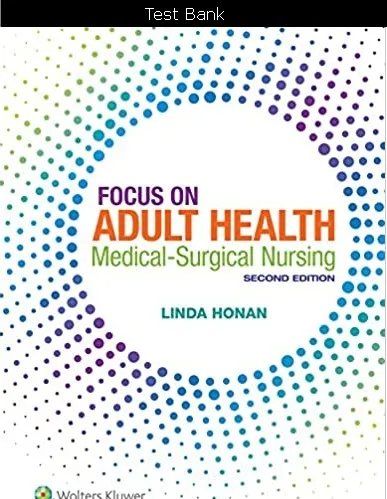Focus on Adult Health Medical Surgical Nursing 2nd Edition Honan Test Bank
$55.00 Original price was: $55.00.$24.00Current price is: $24.00.
Digital item No Waiting Time Instant Download
Chapters: 55
Format: PDF
ISBN-13: 978-1975104887
ISBN-10: 1975104889
Publisher: LWW
Authors: Lippincott Williams & Wilkins
Description
Focus on Adult Health Medical Surgical Nursing 2nd Edition Honan Test Bank
Table of Contents
Focus on Adult Health Medical Surgical Nursing 2nd Edition Honan Test Bank
Chapter 1 The nurse’s Role in Adult Health Nursing
MULTIPLE CHOICE
1.The nurse ensures that a clients bedspace is neat and clean with the call light within easy reach.
The nurse is focusing on which nursing theorist who realized the importance of the environment
for care?
1. Florence Nightingale
2. Sister Callista Roy
3. Dorothea Orem
4. Martha Rogers
ANS: 1
Florence Nightingales theory focused on the environment for care. Sister Callista Roys model is
based in systems theory and an individuals ability to adapt. Dorothea Orems model is the self-
care deficit theory. Martha Rogers model is the science of unitary human beings.
PTS:1DIF:Apply
REF:Emergence of Contemporary Nursing in the United States
2.The nurse is instructing a client on self-administration of insulin so that the client will not need
a health care provider to do this activity. The nurse is implementing which of the following
aspects of Virginia Hendersons theory of nursing?
1. A caring relationship
2. Helping the client achieve independence from the nurses assistance as quickly as possible
3. Integration of objective and subjective data
4. Application of critical thinking
ANS: 2
Virginia Hendersons theory of nursing is to help people achieve health or a peaceful death so that
they can be independent from the nurses assistance as quickly as possible. A caring relationship,
integration of objective and subjective data, and application of critical thinking are included in
the American Nurses Associations essential features of professional nursing.
PTS:1DIF:Analyze
REF:Emergence of Contemporary Nursing in the United States
3.A client tells the nurse that he has an HMO for his health insurance. The nurse understands that
the purpose of this type of health plan is to:
1. ensure payment is made to Medicare for services rendered.
2. maximize the utilization of health care resources.
3. efficiently manage costs while providing quality care.
4. focus on the illness when providing care.
ANS: 3
Health maintenance organizations (HMOs) were created to efficiently manage health care costs
while providing quality care. An HMO is a type of managed care plan with the goal of providing
wellness care and not focusing on the illness during the provision of care. HMOs do not ensure
payment is made to Medicare for services rendered. HMOs also do not maximize the utilization
of health care resources but rather uses financial incentives to decrease care costs.
PTS: 1 DIF: Understand REF: Cost of Care
4.A client tells the nurse that he does not have a primary care physician but rather makes an
appointment with a doctor who specializes in the area in which he is experiencing a problem.
The nurse realizes this client is at risk for which of the following?
1. Fragmented care
2. Overpayment of services
3. Inability to sustain health
4. Finding an appropriate general practitioner
ANS: 1
In the 1980s, the close and trusting relationship between an individual and the individuals
physician waned and was replaced by acquaintances with specialists based upon particular health
care problems. These episodes of care cause fragmentation of care. The client who utilizes
specialists is not at risk for overpayment of services, the inability to sustain health, or finding an
appropriate general practitioner.
PTS:1DIF:AnalyzeREFroviders of Care
5.The nurse is attending a masters degree program in efforts to be educationally prepared to
serve as a hospital leader. The nurse realizes that this educational preparation will:
1. hinder the nurses ability to work with physicians.
2. be viewed as not supporting the profession of nursing by other nurses.
3. ensure the nurse is biased towards clinicians interests.
4.
prepare the nurse to serve as strong clinical support with the ability to integrate business and
caring.
ANS: 4
The nurse is attending an educational program to serve as a hospital leader. This education will
prepare the nurse to serve as strong clinical support with the ability to integrate business and
caring. This education will not hinder the nurses ability to work with physicians. This education
will not be viewed as unsupportive to the profession of nursing. The education will ensure that
the nurse is not biased towards clinicians interests.
PTS: 1 DIF: Analyze REF: Clinical Systems Leadership
6.A client tells the nurse that all hospitals care about is doing the minimum for a client regardless
of the outcome. Which of the following should the nurse respond to this client?
1. It does feel like that sometimes.
2. Health insurance companies have caused this problem.
3. The doctors will get paid regardless of the clients outcomes.





Be the first to review “Focus on Adult Health Medical Surgical Nursing 2nd Edition Honan Test Bank”